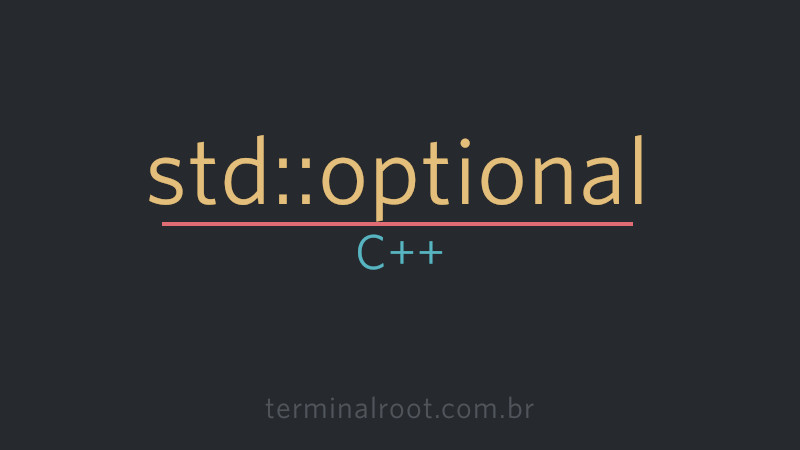
std::optional is a functionality introduced in the C++17 standard library that encapsulates an optional value, that is, a value that can or cannot be present.
It is useful for situations where you want to indicate the absence of a value in a clearer and safer way than using null pointers or special values.
Let’s see some examples of use!
01. Creation and basic use
#include <iostream>
#include <optional>
std::optional<int> find_even_number(int num) {
if (num % 2 == 0) {
return num;
} else {
return std::nullopt; // Indicates absence of value
}
}
int main() {
int num = 4;
auto result = find_even_number(num);
if (result) {
std::cout << "Even number found: " << result.value() << '\n';
} else {
std::cout << "Number is not even.\n";
}
return 0;
}02. Using std::optional with std::string
#include <iostream>
#include <optional>
std::optional<std::string> get_middle_name(const std::string& full_name) {
size_t space1 = full_name.find(' ');
if (space1 == std::string::npos) {
return std::nullopt;
}
size_t space2 = full_name.find(' ', space1 + 1);
if (space2 == std::string::npos) {
return std::nullopt;
}
return full_name.substr(space1 + 1, space2 - space1 - 1);
}
int main() {
std::string name = "Marcos Simoes Oliveira";
auto middle_name = get_middle_name(name);
if (middle_name) {
std::cout << "Middle name: " << *middle_name << '\n';
} else {
std::cout << "Middle name was not found.\n";
}
return 0;
}
03. Handling std::optional
#include <iostream>
#include <optional>
int main() {
std::optional<int> opt;
// Assigning a value
opt = 42;
std::cout << "Value: " << *opt << '\n';
// Removing the value
opt.reset();
if (!opt) {
std::cout << "No value.\n";
}
// Using default value
std::cout << "Value or pattern: " << opt.value_or(-1) << '\n';
return 0;
}04. Working with functions that return std::optional
#include <iostream>
#include <optional>
std::optional<std::string> get_first_word(const std::string& sentence) {
size_t pos = sentence.find(' ');
if (pos == std::string::npos) {
return std::nullopt;
}
return sentence.substr(0, pos);
}
int main() {
std::string sentence = "Hello, World!";
auto first_word = get_first_word(sentence);
if (first_word) {
std::cout << "First word: " << *first_word << '\n';
} else {
std::cout << "The first word was not found.\n";
}
return 0;
}In summary, std::optional is an elegant and safe way to handle optional values in C++, providing a clearer and less error-prone alternative compared to using null pointers or special values.
Useful links
- https://en.cppreference.com/w/cpp/utility/optional
- https://cengizhanvarli.medium.com/std-optional-in-c-06127604815e
- https://www.learncpp.com/cpp-tutorial/stdoptional/
- https://stackoverflow.com/questions/78581072/stdoptional-factory-function-with-guaranteed-copy-elision-and-private-cons




